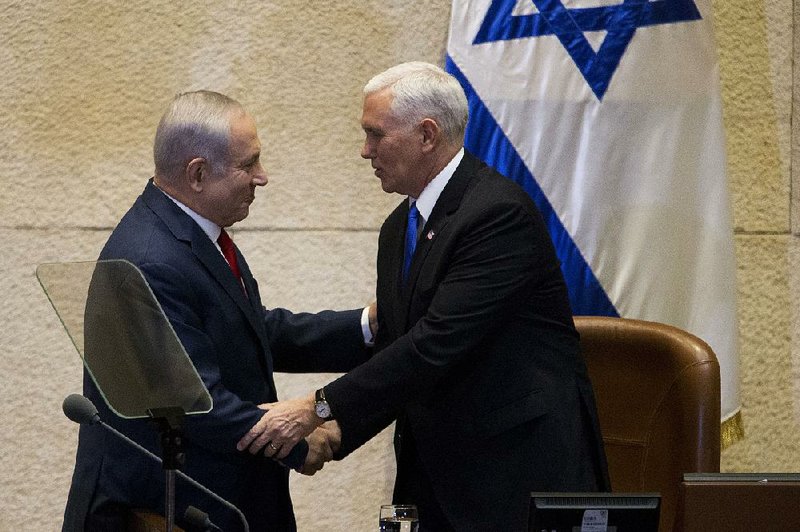JERUSALEM -- Vice President Mike Pence told Israel's parliament on Monday that the U.S. Embassy will move to Jerusalem by the end of 2019, receiving a rousing ovation.
The plan to accelerate the move of the embassy, announced in the first address of a sitting American vice president to the Knesset, marked the highlight of Pence's three-day visit to Israel celebrating President Donald Trump's decision last month to recognize Jerusalem as Israel's capital -- a decision that has set off weeks of unrest and thrown U.S. peace efforts into disarray.
"The United States has chosen fact over fiction -- and fact is the only true foundation for a just and lasting peace," Pence said.
"Jerusalem is Israel's capital, and as such President Trump has directed the State Department to immediately begin preparations to move the United States Embassy from Tel Aviv to Jerusalem," he said.
Pence's speech drew an angry denunciation from the Palestinians, with chief negotiator Saeb Erekat saying it "has proven that the U.S. administration is part of the problem rather than the solution."
Yet Pence, in an interview with The Associated Press after the speech, said he remained hopeful that the Palestinians would re-enter negotiations. "Our message to President [Mahmoud] Abbas and the Palestinian Authority is, the door's open. The door's open. President Trump is absolutely committed to doing everything the United States can to achieve a peace agreement that brings an end to decades of conflict."
The embassy is to be opened in an existing U.S. facility -- a consular service building in the Arnona neighborhood -- that will be "retrofitted" to meet safety and security requirements, Undersecretary of State Steve Goldstein told reporters in Washington. He said Secretary of State Rex Tillerson had yet to sign off on the safety plan for the new facility but would do so in the coming weeks.
The building, which opened in 2010, had been originally envisioned for an interim plan that would allow Trump to quickly fulfill his vow to move the embassy. The building straddles the "green line" that marked Israel's pre-1967 border and what was then a demilitarized zone.
It was unclear after Pence's speech whether Trump intended to break ground later on a new embassy elsewhere in Jerusalem or to use the retrofitted one permanently.
"We expect that to be the embassy," Goldstein said of the retrofitted facility that will open next year. "We do not have a plan at current to build a new embassy."
When Trump announced the decision in December, U.S. officials indicated that it could take three or four years to move the embassy because of security requirements put in place after the 1998 bombings of U.S. embassies in Kenya and Tanzania. Embassy buildings must now be set back at least 100 feet from the street as protection against truck bombs.
As recently as Friday, a senior State Department official told reporters that designing and building a permanent embassy would be "a matter of years, and not weeks or months," though the official acknowledged that an "interim" facility was being considered. The official said the decision was Tillerson's to make.
It was unclear why the time frame has changed so suddenly, and why the announcement was made by Pence, not Tillerson.
Pence was preceded on the Knesset dais by Prime Minister Benjamin Netanyahu, who lavished his guest with praise and gratitude. It was part of an exceptionally warm welcome for Pence in Israel, which has been overjoyed by Trump's pivot on Jerusalem. But the move has infuriated the Palestinians and upset America's Arab allies as well.
A group of Arab lawmakers voiced their displeasure by raising banners saying "Jerusalem is the capital of Palestine" and heckling Pence at the beginning of his address. They were forcibly removed from the plenum.
The main Arab party in the Israeli parliament warned that it would boycott Pence. Its leader, Ayman Odeh, vowed they would not provide a "silent backdrop" to a man he called a "dangerous racist."
Pence responded to the ruckus by saying he was humbled to speak before such a "vibrant democracy," then delved into his prepared remarks about the countries' unbreakable bond.
"I am here to convey one simple message: America stands with Israel. We stand with Israel because your cause is our cause, your values are our values and your fight is our fight," he said. "We stand with Israel because we believe in right over wrong, good over evil and liberty over tyranny."
Pence said the U.S. would back a two-state solution but only if both sides support it. Netanyahu's hard-line government is dominated by opponents to Palestinian statehood, making such a scenario unlikely.
The Palestinians say the U.S. is no longer an acceptable mediator. At talks with European Union foreign ministers in Brussels, Palestinian President Mahmoud Abbas on Monday urged European Union countries to recognize a Palestinian state and to support a negotiated solution to the conflict.
Calling the EU a true partner and friend, Abbas said the Europeans should "swiftly recognize the state of Palestine."
"This would encourage the Palestinian people to keep hoping for peace and to wait until peace is brought about," he told reporters.
French Foreign Minister Jean-Yves Le Drian, meanwhile, said that France wants the EU to start work on an agreement on closer ties with the Palestinian territories, partly in response to Trump's decision on Jerusalem.
Information for this article was contributed by Ken Thomas, Aron Heller, Lorne Cook, Karin Laub and Josh Lederman of The Associated Press; and by Jenna Johnson, Loveday Morris, Carol Morello, Ruth Eglash and Quentin Aries of The Washington Post.
A Section on 01/23/2018

